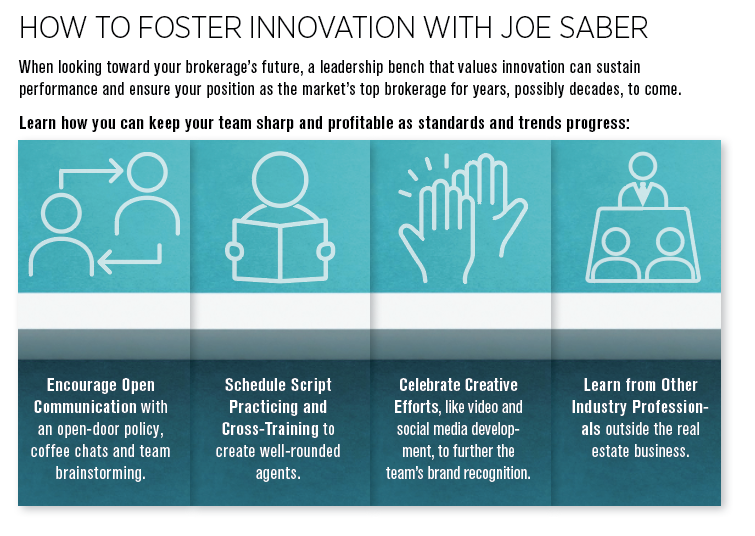Strengthen your real estate team now and tomorrow
Building a robust leadership bench within your real estate business is not just a strategy; it’s a necessity. By actively identifying and developing potential leaders from within, you can create a resilient team that adapts to challenges and drives your business’s success.
 What is a leadership bench?
What is a leadership bench?
A leadership bench refers to a pool of agents ready to step into leadership roles as they become available. It is a strategic approach to ensuring a continuous supply of qualified individuals prepared to lead and minimizing disruptions during transitions.
“Our leadership bench is built upon successful, self-confident people that are willing to accept the challenge of intertwining mentoring and coaching with their successful real estate careers,” says Joe Saber, CRS, regional manager at Crye-Leike REALTORS® in and around Atlanta, Georgia.
In real estate, leadership benches consist of team members with the desire and potential to take the reins when needed.
The importance of a leadership bench
A leadership bench provides a structured approach to succession planning. Preparing future leaders for the common challenges and responsibilities of leadership positions well in advance can drive your brokerage toward long-term success and offer several benefits:
-
- Mitigate Risk
- Higher Employee Retention
- Improved Productivity
- Enhanced Corporate Culture
How to develop a leadership bench
Developing a leadership bench requires careful consideration and strategic foresight. It is not merely about selecting individuals to fill roles but involves a comprehensive process of evaluating each team member’s potential and readiness to lead.
This approach ensures that the right people are qualified to step into leadership positions when necessary and contribute to a supportive environment where future leaders can thrive and grow.
Determine where to hire and promote from
When building your leadership bench, you can promote from within or recruit externally. Promoting within often increases employee satisfaction and loyalty, as team members see clear career paths. Meanwhile, bringing in new talent can infuse your brokerage with fresh perspectives and innovative ideas.Ultimately, what matters is if the candidate is up for the task and will continue to promote an influential and fair work culture.
“I look at people that are really determined to accept the challenge, and they always prove to be folks that have a, you know, very positive attitude and truly want to help the agents, truly want to motivate the agents and team build,” says Saber.
 Mentor agents for leadership
Mentor agents for leadership
Mentorship plays a crucial role in developing future leaders. Pairing aspiring leaders with experienced mentors provides them with guidance, support and firsthand insights into effective leadership practices.
“They [mentors] have highly successful real estate careers, so one of their roles is coaching and mentoring,” Saber says. “And they have a sincere desire to pass their knowledge on to others.”
Encourage agents to take on challenges while providing access to leadership training programs. Offering opportunities for them to work closely with current leaders provides invaluable experience in responsibilities they would otherwise not take on in their current roles.
Saber’s leadership team often coaches new technologies and high-quality customer service to agents aspiring for their own coaching and mentoring roles. Leadership prospects value personal promotion, strategic marketing and high-level customer service.
“If they became a sales manager, I know that they’re going to continue with what made them successful as an agent,” says Saber. “They’re fully vested in a successful outcome, just as they do when they’re talking to their customers and clients.”
Forecast future needs
Understanding the brokerage’s future needs can lead to more individualized prospecting to pinpoint ideal candidates for growth.
“I think first off, start off with what the common goal of the bench is, and then you work from there because you really need to understand what direction you’re going in, or else you’re going in no direction,” Saber says.
Consider those long-term goals and potential industry trends to forecast your leadership. Regularly assess your team’s skills and potential to identify brokerage needs that may arise as your business evolves. This proactive approach ensures that you are ready to address any leadership requirements as they emerge.
By investing in leadership development, you secure your business’s future operations and create a thriving environment where talent can flourish.









